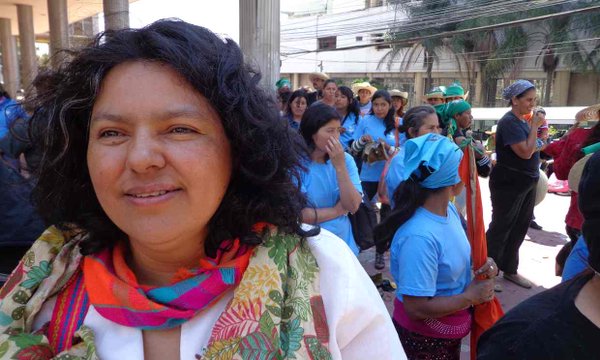Honduras Indigenous Leader Berta Caceres Assassinated in Home.
Varios desconocidos irrumpieron en la madrugada del jueves en la casa de la lider Berta Cáceres y la asesinaron.
Berta Cáceres, coordinadora y co-fundador del Consejo de Pueblos Indígenas de Honduras, o COPIHN, fue asesinada por desconocidos la madrugada de este jueves.
Several unknown assailants broke into Caceres’ home early Thursday and killed her. She was a prominent Indigenous and social movement leader.
Berta Caceres, the coordinator and co-founder of the Council of Indigenous Peoples of Honduras, or COPIHN, was killed by unknown assailants early Thursday morning.
teleSUR correspondent in Honduras, Gilda Silvestruci, confirmed that Caceres was killed at 1:00 a.m. local time inside her home in La Esperanza in the western province of Intibuca.
Caceres was leader of the Lenca Indigenous community and was a staunch human rights defender. She won the prestigious Goldman Environmental Prize in 2015.
“Berta Caceres is one of the leading indigenous activists in Honduras. She spent her life fighting in defense of indigenous rights, particularly to land and natural resources,” said Karen Spring, Honduras-based coordinator of the Honduras Solidarity Network, in a statement. “Her death will have a profound impact on the many Lenca communities that she worked with, COPINH, the Honduran social movement, and all that knew her.”
The attackers waited until the victim went to sleep before breaking into her house and assassinated her. Her brother was injured during the attack, according to local reports.
Caceres was a key leader in a Lenca struggle against the Agua Zarca Dam, a controversial development project in the community of Rio Blanco that was put in motion without consent from local communities. She, along with other residents, led a successful campaign to halt the construction of the dam, but the community has continued to face systematic harassment.
ANALYSIS: Do Feminists Support Coups? Honduran Women on Hillary Clinton
As Adrienne Pine, anthropologist professor at American University, told teleSUR, Caceres was a “powerhouse” and a key figure in fighting racist and exploitative policies and projects that threatened Indigenous rights in the name of corporate profit.
“She was a leader of the popular resistance movement against the 2009 coup, and never stopped fighting,” said Pine, who considered Caceres a dear friend. “Even when she had to go underground to hide from the illegitimate Honduran government’s attempts to criminalize her activism, even when faced with multiple — obviously credible — death threats.”
Caceres’s fellow COPINH leader Tomas Garcia was shot dead in a peaceful protest in 2013. Caceres also faced a slew of repeated death threats and other harassment from state security forces and the company behind the dam project. There have also been past reports that hitmen were hired to assassinate her.
Last month, COPINH issued an alert noting that repression against the Rio Blanco community, including Caceres, had spiked once again. They condemned the harassment and threats community members received for participating in protests and walking to the Gualcarque River, where Agua Zarca planned to build the dam.
OPINION: Disaster Capitalism and Outrage in Post-Coup Honduras
The alert also highlighted the fact that Caceres was protected under precautionary measures from the Inter-American commission for Human Rights.
“Neither precautionary measures from the IAHRC nor the prestigious Goldman Environmental Prize were sufficient to protect her from the violence of the U.S.-supported militarized Honduran state, which along with the corporations she fought is responsible for her murder,” said Pine.
Since the 2009 coup against democratically-elected President Mel Zelaya, the human rights situation in Honduras has deteriorated gravely as human rights defenders and social movements have been systematically criminalized.
According to Global Witness, Honduras is one of the most dangerous and deadly places in the world for land and environmental rights defenders.
This content was originally published by teleSUR at the following address:
“http://www.telesurtv.net/english/news/Honduras-Indigenous-Leader-Berta-Caceres-Assassinated-in-Home-20160303-0010.html”. If you intend to use it, please cite
the source and provide a link to the original article. www.teleSURtv.net/english
http://www.telesurtv.net/english/news/Honduras-Indigenous-Leader-Berta-Caceres-Assassinated-in-Home-20160303-0010.html

